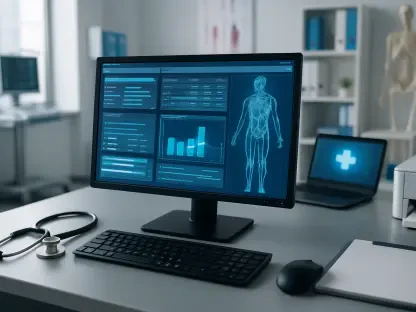The medical billing industry is observing significant expansion, driven by numerous catalysts. Estimated at around USD 15.88 billion in 2023, the global medical billing market is projected to maintain its growth momentum with a compound annual growth rate (CAGR) of 12.14% from 2024 to 2032. Various trends, advancements, and regional factors fuel this growth, underpinning the market’s evolution and prominence in the healthcare sector. The rise in digital transformation, compliance requirements, and efficiency demands in healthcare facilities drives this remarkable growth, indicating a progressive shift in how the medical billing industry operates and evolves.
Rising Emphasis on Compliance and Risk Management
One of the key drivers of growth in the global medical billing market is the increasing focus on compliance and risk management within the healthcare industry. Regulatory frameworks are becoming more stringent, necessitating healthcare providers to adopt robust billing systems that ensure accuracy and mitigate financial risks. Medical billing solutions are crucial in adhering to healthcare regulations, reducing compliance risks, and avoiding hefty fines. As healthcare laws and regulations evolve, the need for sophisticated billing solutions becomes paramount. Healthcare organizations are investing heavily in advanced billing technologies to maintain compliance and streamline operations. This trend does not only enhance the accuracy of billing processes but also fosters trust among patients and stakeholders by ensuring transparency and reliability.
Further, the increasingly complex regulatory landscape requires healthcare providers to stay current with frequent changes in billing codes and compliance requirements. This has resulted in substantial investments in technologies capable of automatic updates and real-time adjustments. The implementation of advanced billing systems helps in adapting to these changes seamlessly, thereby minimizing risks and promoting better oversight. By adopting state-of-the-art billing solutions, healthcare facilities can safeguard themselves against potential legal entanglements and financial losses, contributing to sustained market growth. The focus on compliance and risk management illustrates the critical role of medical billing systems in sustaining the integrity of healthcare operations and financial management.
Demand for Efficient Medical Billing Processes
Efficient medical billing processes are critical for the smooth functioning of healthcare facilities. The industry’s push towards operational efficiency has led to an increased demand for streamlined billing systems. Hospitals and clinics are focused on reducing administrative burdens on healthcare practitioners, allowing them to concentrate on patient care rather than paperwork. The need for efficiency has led to the adoption of innovative billing technologies that automate and simplify billing procedures. These systems enhance the accuracy of billing, reduce administrative errors, and ensure timely reimbursements. Consequently, healthcare providers can improve their revenue cycle management and financial performance, driving the overall growth of the medical billing market.
In addition, efficient billing processes play a pivotal role in mitigating the challenges posed by labor shortages in the healthcare sector. The automation of billing tasks alleviates the workload of administrative staff and healthcare professionals, ensuring that healthcare facilities can operate smoothly even with limited manpower. Efficient billing practices also facilitate quicker turnarounds in claims processing, reducing the waiting times for reimbursement. The implementation of advanced billing systems translates into better cash flow management and financial stability for healthcare providers. As the industry continues to evolve, the ongoing demand for efficiency within billing operations presents continuous opportunities for growth and improvement in the medical billing market.
Efforts to Reduce In-House Operational Costs
Healthcare facilities across the globe are under constant pressure to reduce operational costs while maintaining high standards of care. In-house management of medical billing processes can be costly and resource-intensive. This has led many healthcare providers to consider outsourcing their billing operations to specialized firms. Outsourcing medical billing offers a cost-effective alternative, enabling healthcare providers to save on overhead expenses and allocate resources more efficiently. By partnering with external experts, healthcare facilities can benefit from improved billing accuracy, faster processing times, and better compliance with regulatory standards. This trend is gaining traction and significantly contributes to the market’s growth.
Moreover, outsourcing medical billing processes not only reduces operational costs but also allows healthcare providers to access expert knowledge and specialized skills. Third-party billing service providers often bring a wealth of experience and advanced technological capabilities that may not be available in-house. This results in more effective and accurate billing processes, minimizing the likelihood of errors and missed reimbursements. Additionally, outsourcing can help healthcare providers remain adaptive and responsive to changing regulatory conditions without bearing the burden of continuous staff training and system upgrades. By enabling healthcare organizations to focus on core competencies and patient care, outsourcing emerges as a compelling strategy for enhancing operational efficiency and ensuring financial sustainability.
Growth of Online Billing Platforms
The digital transformation of the medical billing industry is a significant trend driving market expansion. The rise of online billing platforms is revolutionizing the way medical billing is conducted. These platforms offer numerous advantages, including speed, convenience, and accuracy, making them highly appealing to healthcare providers. Online billing platforms facilitate real-time data access and integration, enhancing the efficiency of billing processes. They also support better coordination between different stakeholders, including patients, insurers, and healthcare providers, ensuring smooth and transparent transactions. The adoption of these digital solutions is further supported by government initiatives aimed at modernizing healthcare infrastructure.
Real-time access to billing information provides numerous strategic advantages to healthcare providers, enabling more accurate financial planning and better cash flow management. Online billing platforms’ capabilities to integrate with other healthcare systems, such as EHR and EMR systems, further enhance their utility and effectiveness. This integration simplifies the entire billing workflow, reduces manual entry errors, and ensures seamless and comprehensive management of patient data. Additionally, the security features embedded in online billing platforms protect sensitive patient information, fostering trust and compliance with data protection standards. The shift towards digital solutions is not only enhancing operational efficiency but also driving a new era of transparency and reliability in medical billing practices.
Government Support and Initiatives
Government support plays a pivotal role in driving the growth of the global medical billing market. Various governments worldwide are investing in healthcare modernization efforts, including funding for advanced billing systems. In particular, initiatives promoting the adoption of electronic health records (EHR) and electronic medical records (EMR) systems are accelerating the integration of sophisticated billing solutions. Governments are keen on enhancing the efficiency and transparency of healthcare services. By endorsing the implementation of advanced billing technologies, they are paving the way for improved data management, reduced administrative burdens, and enhanced patient outcomes. This governmental backing is crucial for the sustained growth of the medical billing market.
These governmental initiatives often come in the form of financial incentives, grants, and regulatory mandates, encouraging healthcare providers to modernize their billing systems. As part of broader strategies to elevate national healthcare standards, these initiatives also focus on improving the interoperability and integration of healthcare information systems. This collective push towards digitalization and modernization not only benefits healthcare providers but also enhances patient care quality and healthcare accessibility. The continuous support and intervention by governmental bodies create a favorable environment for the widespread adoption of advanced billing technologies, thus fueling the market’s expansion and ensuring the industry’s resilience amidst evolving healthcare dynamics.
Technological Advancements
Technological advancements are at the heart of the growth in the medical billing market. Innovations such as artificial intelligence (AI), cloud solutions, and automation are transforming the landscape, driving efficiency and accuracy in billing processes. AI and machine learning are increasingly utilized to analyze billing data, detect anomalies, and predict trends, thereby improving the accuracy and efficiency of billing operations. Cloud-based solutions offer scalability, flexibility, and accessibility, making them attractive to healthcare providers. These solutions facilitate real-time data integration and accessibility, enhancing operational efficiency. Furthermore, automation of repetitive billing tasks reduces human error and expedites the billing process. Automated billing systems can manage large volumes of transactions efficiently, thus boosting overall productivity. The integration of these innovative technologies is a key factor propelling the market forward.
The AI-driven analytical tools in medical billing systems are particularly significant in identifying patterns and discrepancies that could potentially hamper financial performance. Predictive analytics, powered by machine learning, provides insights that aid in better decision-making and proactive problem-solving. Concurrently, cloud-based systems offer robust backup solutions and disaster recovery options, ensuring continuity of operations even during unforeseen disruptions. Automation simplifies tedious and repetitive tasks, freeing up human resources to focus on more critical and complex aspects of billing and patient care. As these technologies advance and integrate further into medical billing systems, they will continue to refine and enhance the overall billing landscape, leading to greater efficiencies and improved patient and provider experiences.
Regional Insights
North America
North America holds a dominant position in the global medical billing market, attributable to its advanced healthcare infrastructure, sophisticated medical coding practices, and significant investments in IT medical technologies. The region’s adoption of electronic medical records and the presence of major market players bolster its market share. The emphasis on technological innovation within the medical billing sector in North America ensures that healthcare providers have access to cutting-edge solutions, enhancing the efficiency and accuracy of their billing processes. The concentration of prominent market players in the region also stimulates competition and drives continuous improvement in billing systems and services.
Additionally, North America’s ongoing efforts to address healthcare inefficiencies through policy reforms and regulatory initiatives contribute to the market’s robust growth. The support for value-based care models and the push towards interoperability further reinforce the need for advanced medical billing solutions. Through a combination of progressive regulatory measures, sizeable public and private investments, and an inherent culture of innovation, North America remains at the forefront of the global medical billing market, paving the way for future advancements and playing a critical role in shaping the industry’s direction.
Europe
Europe also represents a significant portion of the medical billing market, with countries such as the UK, Germany, France, and Italy playing key roles. The region benefits from extensive healthcare systems, government support for digital healthcare initiatives, and a focus on reducing administrative costs. European healthcare providers are increasingly inclined towards digital solutions that promise efficiency and accuracy, echoing trends seen in North America. Government incentives and regulatory frameworks aimed at fostering digital transformation are pivotal in driving the adoption of advanced billing systems across Europe.
Moreover, the European market is characterized by a strong focus on compliance with stringent healthcare regulations, making robust and transparent billing systems a necessity. Collaborative efforts among European nations to standardize healthcare protocols and enhance cross-border healthcare services also stimulate the demand for adaptable and responsive billing solutions. The commitment towards streamlining healthcare administration and reducing operational costs is reflected in the increasing deployment of sophisticated billing technologies within the region. Europe’s proactive stance on healthcare digitalization, combined with its robust support structures, ensures its continued prominence and growth within the global medical billing market.
Asia Pacific
The Asia Pacific region is emerging as a significant player in the global medical billing market, driven by factors such as rapid urbanization, increasing healthcare expenditure, and the adoption of advanced technologies. Countries like China, India, and Japan are investing heavily in healthcare infrastructure and digital health solutions. The region’s growing population and rising demand for healthcare services necessitate efficient billing systems to manage the influx of patient data and financial transactions. Government initiatives aimed at healthcare modernization and the implementation of digital health records are also driving the adoption of advanced medical billing solutions in the Asia Pacific region.
Technological advancements and the increasing presence of global medical billing companies in the Asia Pacific are further enhancing the region’s market growth. The availability of cost-effective labor and a favorable regulatory environment make it an attractive destination for outsourcing medical billing services. Moreover, the region’s focus on improving healthcare quality and accessibility aligns with the broader trends of digital transformation and operational efficiency. As the Asia Pacific region continues to grow and evolve, it is poised to become a major contributor to the global medical billing market, offering significant opportunities for innovation and expansion.









